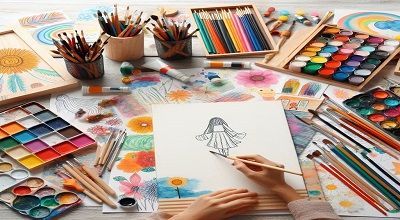Arts to Crucial Cognitive Skills
Engagement in the arts can significantly impact the development and enhancement of crucial cognitive skills. These skills encompass a range of mental processes and abilities essential for various aspects of learning and daily life. Here are some of the crucial cognitive skills that can be improved through involvement in the arts:
- Creativity: Participation in the arts encourages creative thinking and problem-solving. It requires individuals to think outside the box, explore new ideas, and experiment with different approaches to artistic expression. This can transfer to other areas of life where creativity is needed.
- Critical Thinking: Analyzing and interpreting works of art, whether visual, musical, or literary, demands critical thinking. It involves making judgments, evaluating evidence, and forming reasoned arguments. These skills are valuable for decision-making and problem-solving in many contexts.
- Attention to Detail: Creating or appreciating art often requires a high level of attention to detail. This can enhance an individual’s ability to focus, notice subtleties, and be meticulous, which can be useful in fields such as science, engineering, and even everyday tasks.
- Spatial Reasoning: Visual arts, such as drawing and sculpture, involve spatial reasoning, as artists need to understand how objects fit together in a three-dimensional space. This skill can translate to improved spatial skills, which are essential in mathematics and engineering.
- Pattern Recognition: Music, dance, and visual arts often involve patterns. Recognizing and creating patterns can improve cognitive skills related to recognizing patterns in data, solving puzzles, and understanding complex systems.
More Here…
- Memory: Learning and performing pieces of music, lines from a play, or the steps of a dance routine can improve memory. This is applicable not only to memorization tasks but also to retaining and recalling information in various domains.
- Emotional Intelligence: The arts can foster emotional intelligence by encouraging individuals to express and interpret emotions through artistic means. This can lead to improved empathy, social skills, and understanding of human emotions and behavior.
- Communication Skills: Engagement in the arts often requires effective communication, whether it’s through written or spoken words, body language, or musical expression. These skills can enhance an individual’s ability to communicate clearly and persuasively in various situations.
- Problem-Solving: Creative processes in the arts involve overcoming challenges and finding innovative solutions. These problem-solving skills can be applied to real-world situations and professions that require innovative thinking.
- Discipline and Patience: Mastering an art form takes time, effort, and patience. The discipline required to practice and improve in the arts can be transferred to other areas of life, helping individuals achieve their goals.
Final Words
In conclusion, involvement in the arts can have a profound and positive impact on crucial cognitive skills. Whether through formal education or personal pursuit, engaging with the arts can enhance creativity, critical thinking, attention to detail, spatial reasoning, memory, emotional intelligence, communication, problem-solving, and other cognitive abilities that are valuable in various aspects of life.
